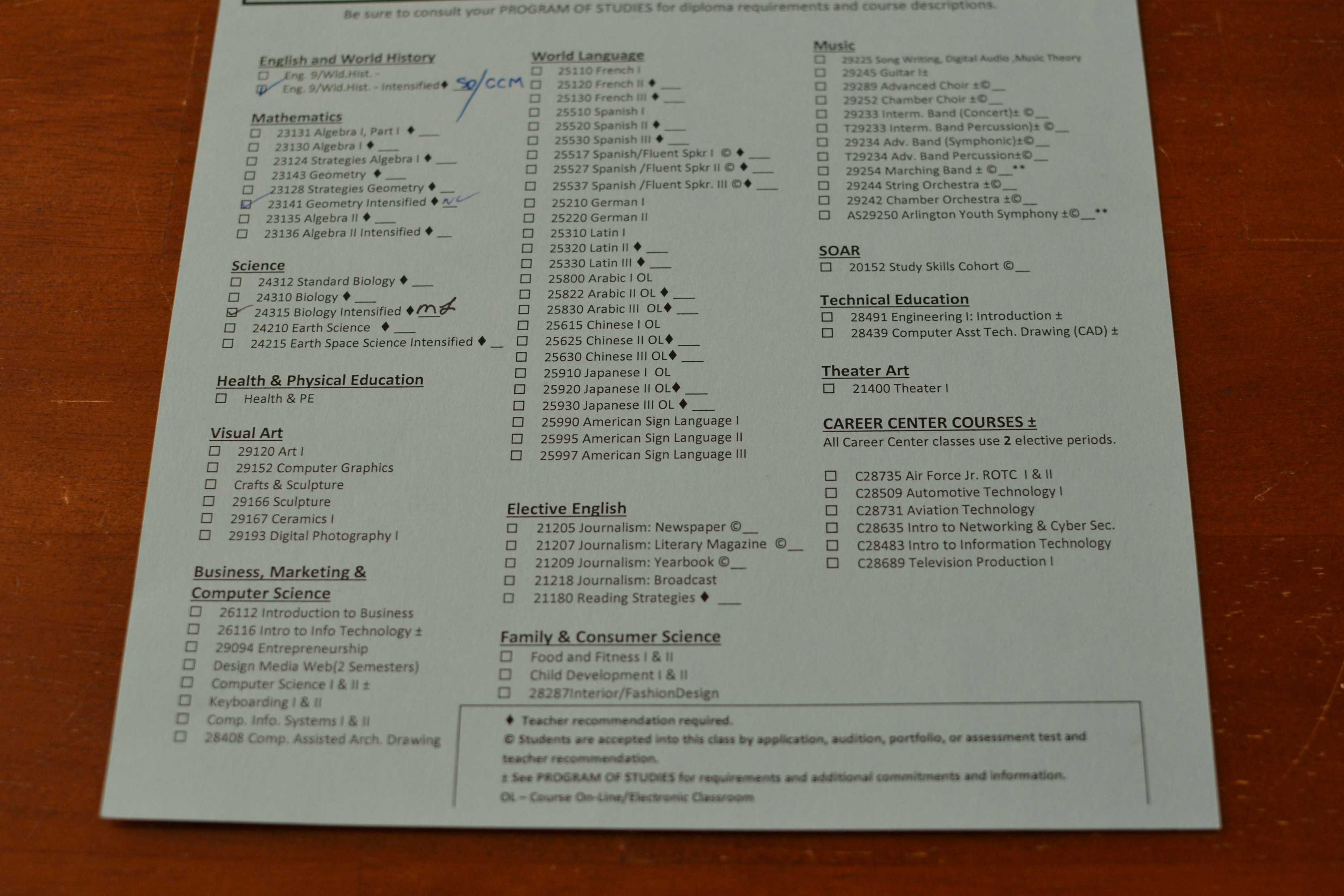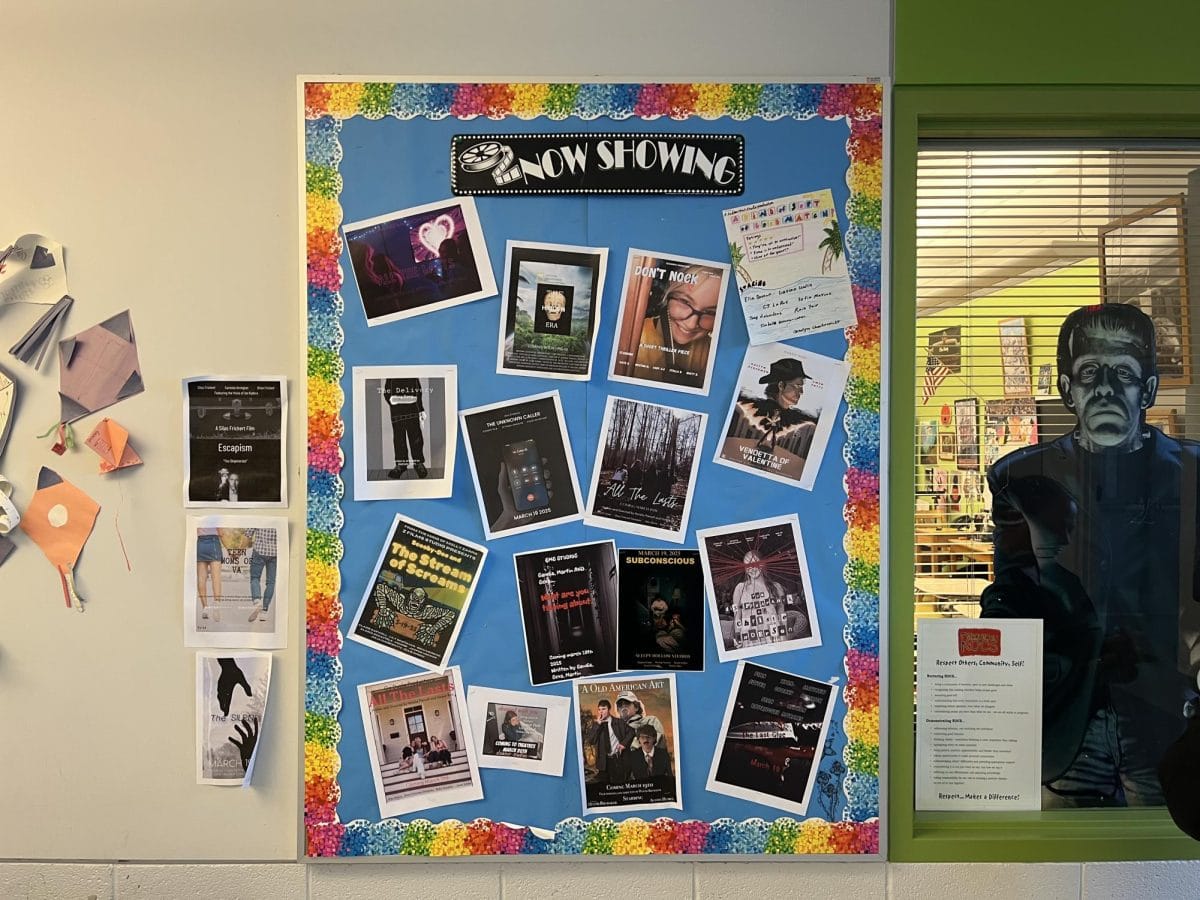The second quarter has come and gone, and while this brings a sense of relief for some, a flurry of activity lies in store for others. Counselors are in the process of scheduling conferences with students to discuss their four-year plans, and it is only a matter of days before the infamous yellow cardstock Course Request Forms (CRFs) begin circulating the halls. The prospect of tailoring next year’s schedule can produce feelings of excitement and anticipation in many students; however, it can also be somewhat stressful. After all, the goal for choosing classes is to challenge oneself in an engaging environment, while still allowing for a healthy balance between school and social activities.
As school staff would agree, the number one problem that holds students back from stepping out of their comfort zones is peer pressure and rumor-spreading. Upperclassmen are notorious for preaching down to younger grades vis-à-vis which classes they liked or hated, as well as which teachers to seek out or avoid altogether. True, some of this advice-giving can be well-intentioned, but in practice students are more satisfied and successful when they follow their gut instincts and choose paths that work for them specifically. To aid students in their respective journeys, the Sentry has compiled a list of the top CRF rumors, and debunked them.
Rumor #1: Students should select prospective classes based purely on the teachers they want.
Of all the misconceptions students have, this is probably the biggest. Not only does this way of operating discredit Yorktown’s superb staff and high standard of teaching, but it also reveals students’ flawed understanding of the way classes are arranged for the following school year.
Not only do classes have different teachers each year, but many classes have multiple teachers. In order for a teacher to be assigned to a specific course, the class itself must “make up.” In other words, enough students must enroll in the the course for it to be available in the future. It is not until the end of the year that teachers find out which classes they will be teaching. For this reason, student cannot afford to miss out on interesting learning experiences and should let neither fear nor favoritism influence their decision-making processes.
“[Students] should decide which classes to take based on what appeals to their individual interest and not based on what others say or think, or who the teacher may be, because that can change each year,” said Advanced Placement (AP) European History teacher Thomas Lenihan.
Rumor #2: AP World History is far easier than AP Euro and does not require as much hard work.
During the transition between freshman and sophomore year, one of the most anxiety-inducing decisions rising sophomores face is whether or not to take their first AP class. They are provided with several social studies options, but the ongoing dispute over the varying levels of difficulty makes it challenging to make an independent and unbiased decision. Many students demonstrate an interest in AP European history, but opt to take AP World History as a result of the misinformation imparted to them by their friends.
Junior Sutton Coyle has addressed this form of “peer pressure” while selecting his classes in previous years.
“Before I took AP Euro last year I was told that I shouldn’t take it because it was harder than AP World. I was starting to doubt my decision to take the class but decided to see how it went. I feel like the only difference between the two courses is the amount of detail in AP Euro. This detail gives the illusion that it is more difficult when in reality the material is just goes farther in depth. I know lots of people who took World and both classes seemed very difficult. I think it all comes down to preference,” said Coyle.
Lenihan is also quick to dispel any and all misconceptions that one course is harder than the other.
“As someone who has taught both AP Euro and AP World, I can say both courses are challenging and rigorous. The assignments may vary but both are a similar AP exam format with 3 essays and multiple-choice taken over three and a half hours in May. If you like to go in depth in history then you might prefer AP Euro since the course covers the modern history of just one continent. If you want to cover a lot of history and touch on civilizations and connections globally, then you might prefer AP World,” said Lenihan.
Lenihan also emphasizes that every AP class offered to students presents a unique learning opportunity that will provide them with educational tools and prepare them for college.
“I don’t think any AP class should be considered ‘easy’ because they require students to do outside reading, homework and writing. No teacher can cover it all in class before the AP exam. I know I set high expectations and require a lot of my students with the goal of getting them to like history, learn a lot, improve their critical thinking and writing skills and pass the AP exam. I’ve had students return from college over the years to say my class prepared them well for college and was most similar to a college class,” said Lenihan.
Junior Zoe Spirgel was eager to offer concrete evidence as to why AP World was a worthwhile class.
“AP World serves as a forum for self discovery. The fantastic course agenda humbles students and creates a more realistic portrayal of our world as a whole. Personally, this course totally changed my opinions on many different world issues. By understanding the past we can accurately make statements and understand the changes that need to come in the future. I promise this course will challenge and excite you, but I am positive AP Euro will as well if it is the right fit for you,” said Spirgel.
Advanced Placement World History teacher Debra Cave agreed wholeheartedly.
“[AP World and AP Euro] are more similar because both are rigorous and require commitment to continuous improvement and time management skills, both develop critical thinking and writing skills and both provide a solid foundation for future academic studies. You can’t go wrong,” said Cave.
Rumor #3: AP U.S. History is the hardest college-level class and is impossible to do well in.
Advanced Placement U.S. History often gets a bad rap for being incredibly fast-paced and in-depth. The course is designed to allow students to explore events of U.S. history through the use and analysis of documents, images, cartoons, quantitative data and other primary sources, as well as to develop an understanding of major themes in U.S. history, including American identity, economic and social life, political change and continuity, and America’s role in the world. While that may sound like a mouthful, it is important to recognize that AP U.S. History is on par with other AP classes and is not unusually trying.
Students like Spirgel have not only found themselves completely prepared to handle the workload presented by AP U.S. History, but they also tend to enjoy it.
“Most underclassmen complain APUSH will ‘kill you’ and is the hell of all histories. I beg to differ. APUSH is not impossible; like most things in life it requires hard work and perseverance. The study of the past should never be a particularly hard subject to conquer. Learning about the past of country is extremely interesting and aids our understanding of the transformations our country as made throughout its existence. Because it is strictly U.S history, it directly affects us and therefore is relatable,” said Spirgel.
A.P. U.S. History teacher Kevin Bridwell was surprised to discover that some students have allowed the misguided advice of their peers to discourage them from enrolling in the class.
“It is an Advanced Placement course and it really should not be unreasonably stressful to students. I personally try to spice up the content with fun lectures and activities. Of course, it is an added bonus if you actually like history, but overall the class is very manageable,” said Bridwell.
Rumor #4: Earth Science is an “easy A” class compared to other available science courses.
Yorktown is well known for its strong science department that offers everything from biology to environmental sciences to astronomy. Despite the fact that every science course is taught with the same care and attention on the part of the teachers, some students still seem to be under the impression that the quality of education differs between classes. Many students claim that classes like Earth Science do not provide the same exhaustive learning experience that Biology or Chemistry do.
Junior Sarah Oldham asserted that this is utterly hearsay.
“When I took Earth Science sophomore year, I believed I would be challenged and I definitely wasn’t wrong. I had to memorize so much information including the different kinds of rocks, their layers, their textures and other characteristics that I never knew existed. The content was not abstract or difficult to understand, but putting it into practice for tests and quizzes proved to be just as challenging as any other science,” said Oldham.
When asked to discuss the matter, Biology teacher Adrienne Wright summarized the facts perfectly and described her stance on the matter.
“If I have anything to say on the matter it is that anyone looking to take a class because they heard it was easy will be surprised by anything that is not. It is as simple as that,” said Wright.






































